
How can I meet the English language requirement in my partner visa application?


In this blog post we look at the English language requirement for those making UK partner visa applications. It is a sub post of our full guide on How to apply for a partner visa.
This post is intended to provide general background on the relevant issues. These rules can be complex, and the requirements of the route will vary from application to application.
Whilst we have done our best to ensure that the information here is accurate at the time of writing, the UK immigration rules change frequently, so you should always check the position at the time you make your application.
This post was written by Nick Nason, director of Edgewater Legal. Book in a free initial call with Nick if you want to discuss getting help with your application, or would like to explore what getting help looks like.
Background
There has been an English language requirement for those making UK partner visa applications since 2010.
Here we look at what you’re going to need in your partner application to meet the requirement, and accompanies our YouTube video covering the same material.
Further information on the partner visa application process and other eligibility requirements can be found in our main post How to apply for a partner visa.
What level of English is required?
The level of English required depends on where you are in your immigration “journey” and is measured on the catchily titled Common European Framework of References for Languages (CEFR), summarised here:
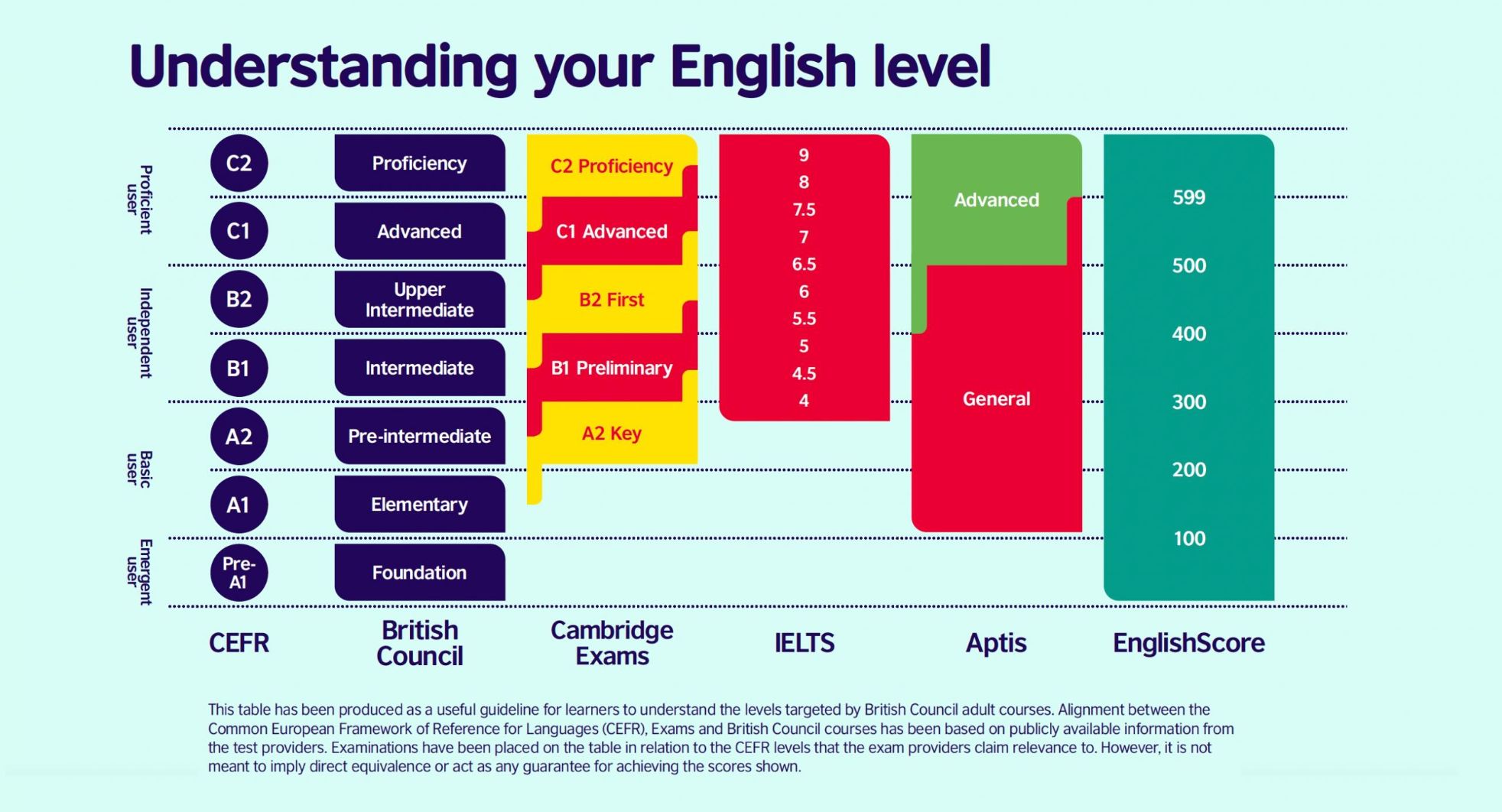
In the first application – either from within the UK or from outside – applicants must show that they meet level A1 CEFR or above (unless an exemption applies).
How difficult is this? You can see the required aptitude of an A1 learner here:

Applicants are only tested on their speaking and listening, not writing or reading.
In the extension application applicants must achieve CEFR level A2 (unless they got an exemption in the first application, or they were last granted as a fiancé(e) or proposed civil partner, in which case they only need to meet A1 in their extension).

At the stage of applying for Indefinite Leave to Remain/settlement, you have to achieve B1 level in order to meet the English language requirement. Again, this is based on your speaking and listening skills only.
How can you meet the requirement?
There are three ways it is possible to meet the requirement in a family visa application. If you don’t meet one, then move on to the next:
- Be from a country on the majority English speaking country list
- Have a degree (BA or above) awarded in the UK (or taught in English outside of the UK and approved by Ecctis)
- Pass a specified English language test
There are some limited exemptions, and we will cover those briefly.
Option 1: National of a majority English speaking country
The most straightforward one first.
If you are a national – including dual nationality – of one of the countries listed below (correct at the time of writing, see guidance here to confirm current position), you will be deemed to meet the English language requirement as a national of a majority English speaking country:
- Antigua and Barbuda
- Australia
- the Bahamas
- Barbados
- Belize
- Canada
- Dominica
- Grenada
- Guyana
- Jamaica
- Malta
- New Zealand
- St Kitts and Nevis
- St Lucia
- St Vincent and the Grenadines
- Trinidad and Tobago
- United States of America
You would usually need to provide a scan of your passport confirming your nationality of one of the countries listed above, and you would usually be providing this in any event with your application.
Option 2: Academic qualifications taught in English
The applicant will meet the English language requirement if they have a bachelor's or master's degree or PhD that was taught in English.
The key thing to understand is what evidence needs to be provided of this, and which depends mainly on where the academic qualification was awarded.
a. Degree awarded in UK
If the degree – a Bachelor’s or Master’s, or PhD – was awarded in the UK, you only need to provide one piece of evidence, which is the degree certificate itself.
In certain circumstances, if the degree certificate is not available, an academic transcript or reference letter which contains certain specified information can be provided.
b. Degree awarded outside of the UK, but in one of specified English-speaking countries
If the degree was awarded in one of the following countries, the Home Office will assume that it was taught or researched in English at or above the required CEFR level:
- Antigua and Barbuda
- Australia
- the Bahamas
- Barbados
- Belize
- Dominica
- Grenada
- Guyana
- Ireland
- Jamaica
- Malta
- New Zealand
- St Kitts and Nevis
- St Lucia
- St Vincent and the Grenadines
- Trinidad and Tobago
- the UK
- the USA
You will note that this is a slightly different list from the one above, and does not include Canada.
Those in this situation need to provide two documents: their degree certificate PLUS a confirmation from Ecctis that the qualification meets or exceeds the recognised standard of a Bachelor’s or Master’s degree or PhD in the UK.
This is known as an Academic Qualification Level Statement, and looks like this:
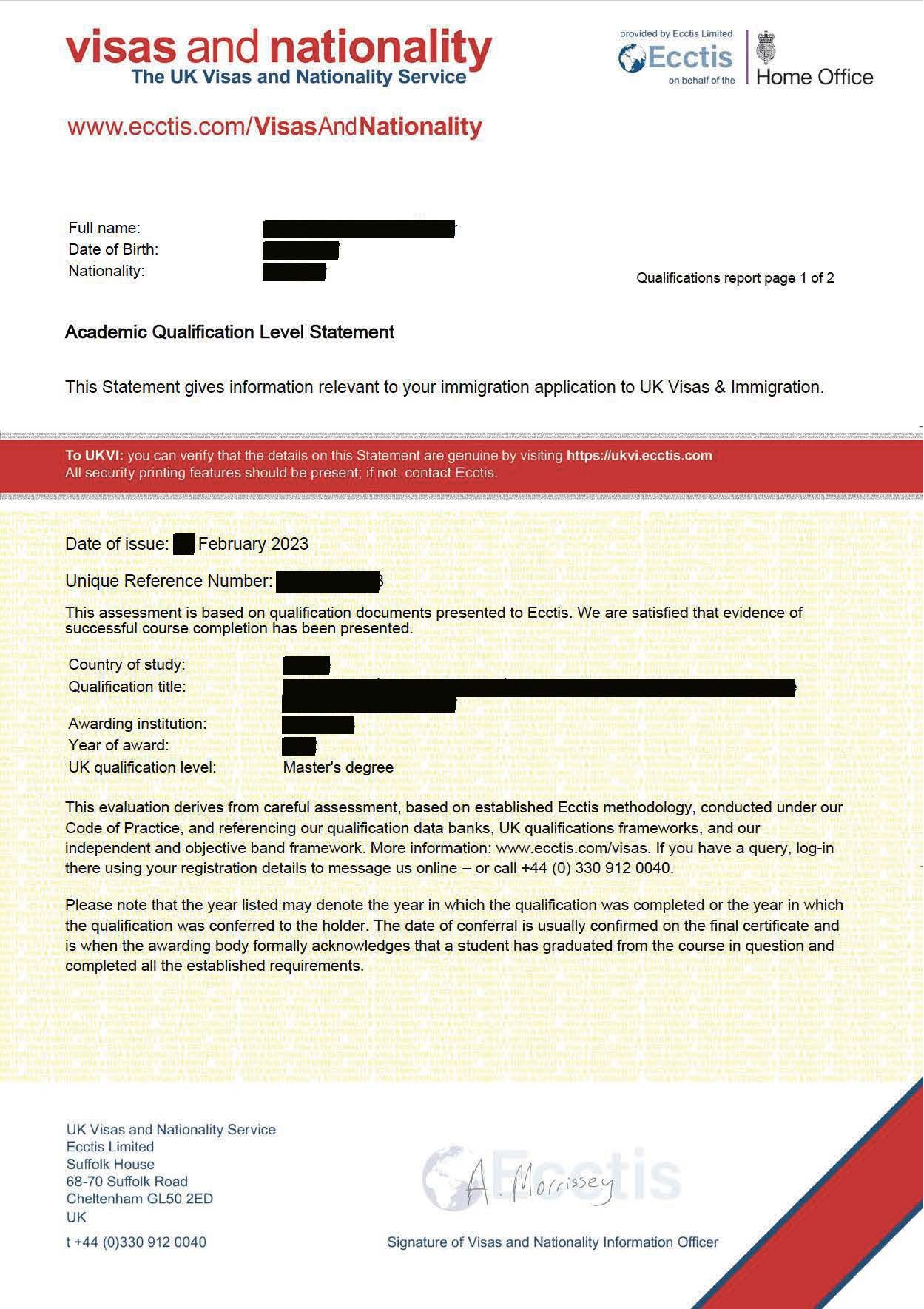
The reason for this is to check that the degree you have is the equivalent of a UK Bachelor’s, Master’s or PhD.
c. Degree awarded outside of the UK, not from specified English speaking country
If your qualification was obtained outside of the UK, but from a specified English-speaking country, then you need to provide three documents: your degree certificate, the Academic Qualification Level Statement from Ecctis PLUS the English language proficiency confirmation from Ecctis (if you have requested both from Ecctis at the same time they will usually come in the same PDF document).
The English language proficiency document looks like this:
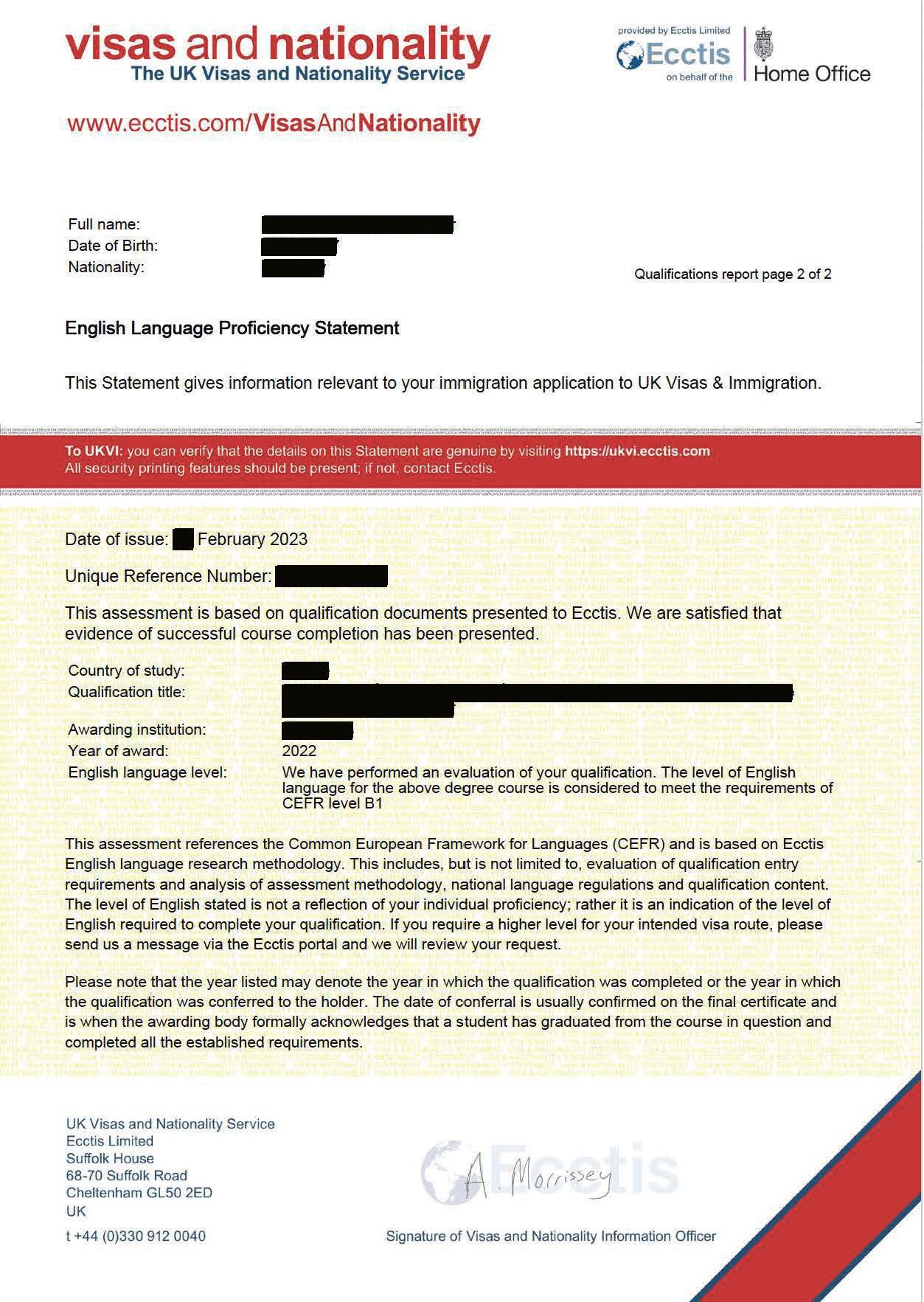
A reminder that if you have a degree from Canada, you will need to have all three documents in order to rely on your academic qualification.
This is because that, whilst Canada is on the list of majority English speaking countries, it is not on the list of countries where the Home Office will automatically assume that your degree was taught in English.
Option 3: Passing a test
The most important point to note about taking a test, is that you can’t just take any test. The reason for this is that it was reported that test providers were found to have assisted takers in cheating on their tests in 2014:
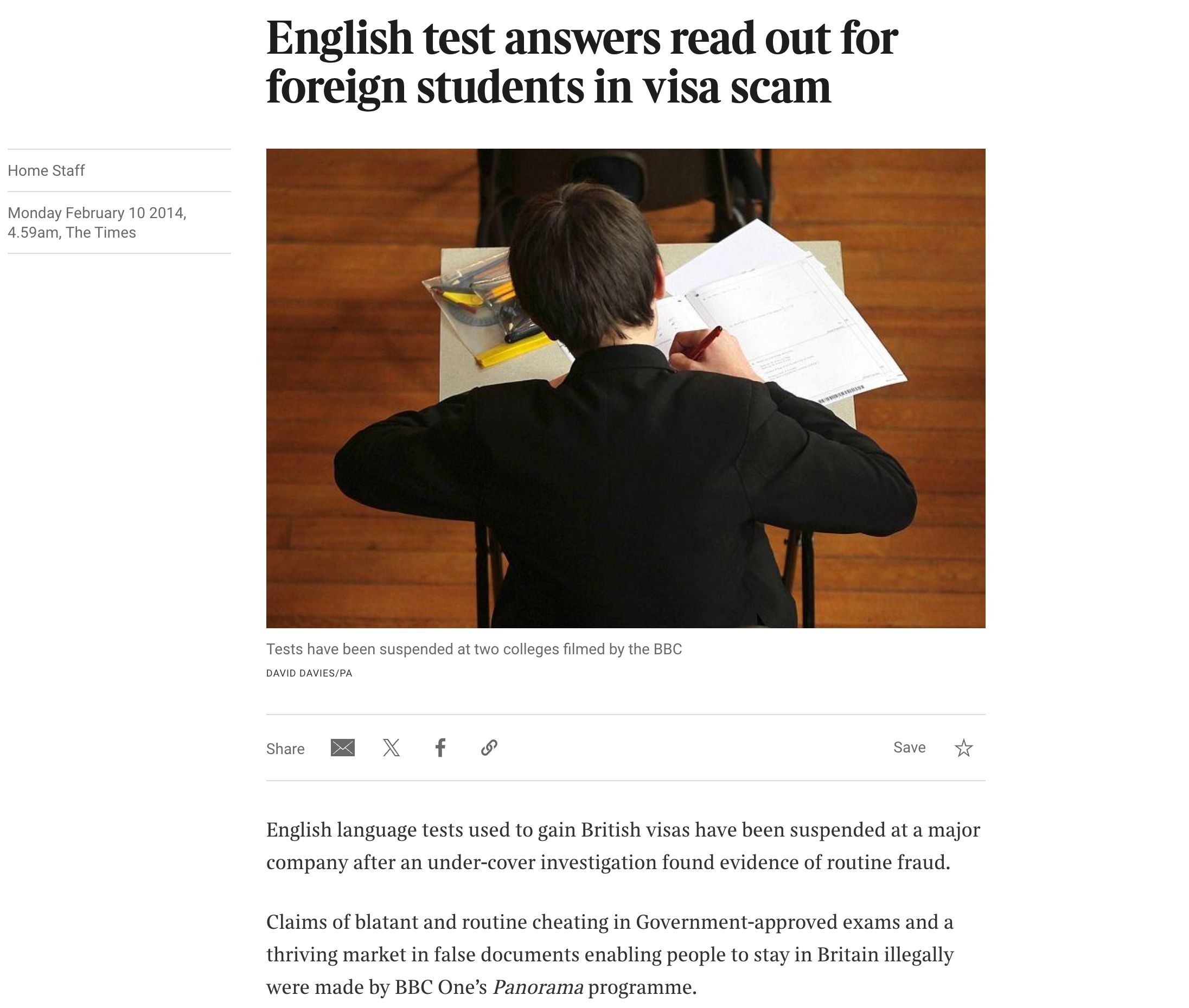
The Home Office introduced additional requirements for test-takers, shaping the requirement that has to be met today, the end result being that the Home Office will only accept specific tests, administered by specific providers, taken in certain locations.
The approved tests are listed in the relevant guidance: it’s up to you which test to take. These also tend to change often, so make sure you check the up to date position on the Home Office website.
A1:
- Graded Examinations in Spoken English (GESE) offered by Trinity College London (available in the UK)
- IELTS Life Skills offered by the IELTS SELT Consortium (available in the UK and overseas)
- International ESOL offered by LanguageCert (available in the UK and overseas)
- PTE Home offered by Pearson PTE (available in the UK and overseas)
- Skills for English UKVI offered by PSI (UK) Ltd (available overseas only)
A2:
- Graded Examinations in Spoken English (GESE) offered by Trinity College London (available in the UK)
- IELTS Life Skills offered by the IELTS SELT Consortium (available in the UK and overseas)
- International ESOL offered by LanguageCert (available in the UK and overseas)
- PTE Home offered by Pearson PTE (available in the UK)
- PTE Academic offered by Pearson PTE (available in the UK)
- Skills for English UKVI offered by PSI (UK) Ltd (available overseas only)
When you get the test certificate it should have a reference on it, and which you enter into the application form.
There is guidance (accurate at the time of writing/recording) on what to include in the online form:
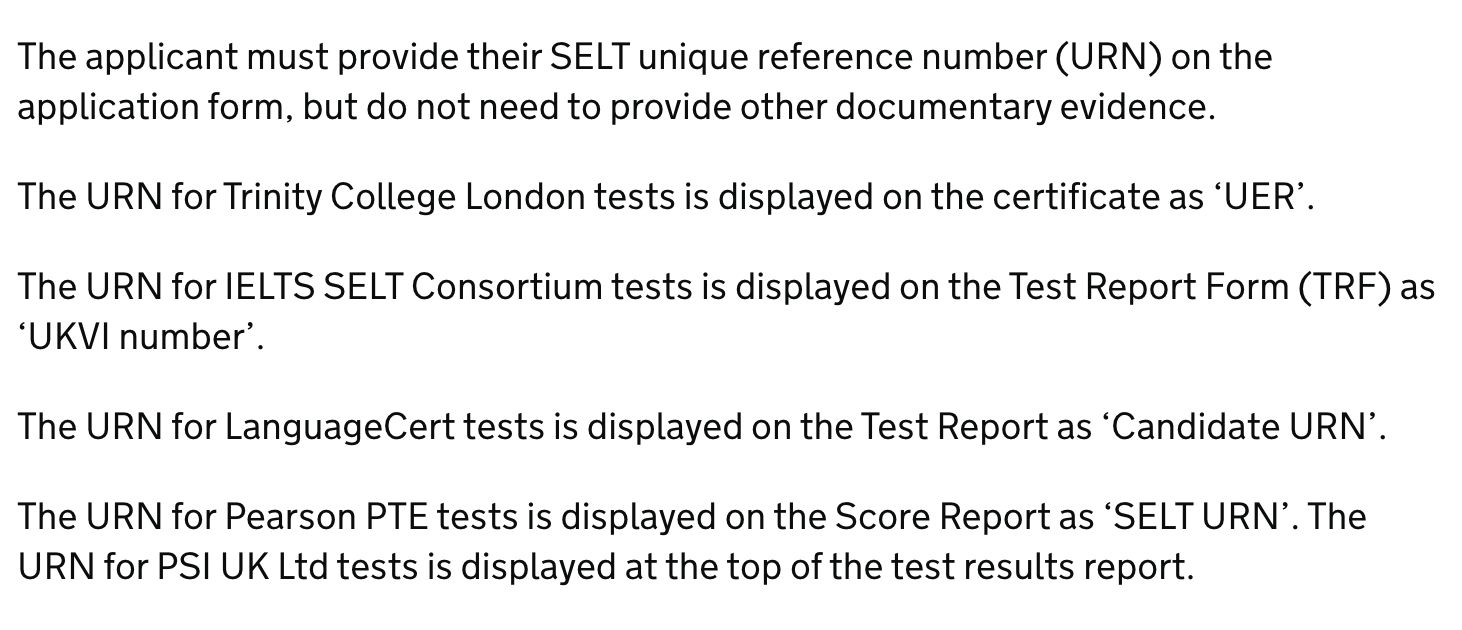
If your certificate or test report form does not have the relevant reference, then you have either taken the wrong test, or something else has gone wrong with the production of the certificate.
Here’s what some of the certificates look like with the URN highlighted (correct at the time of writing):
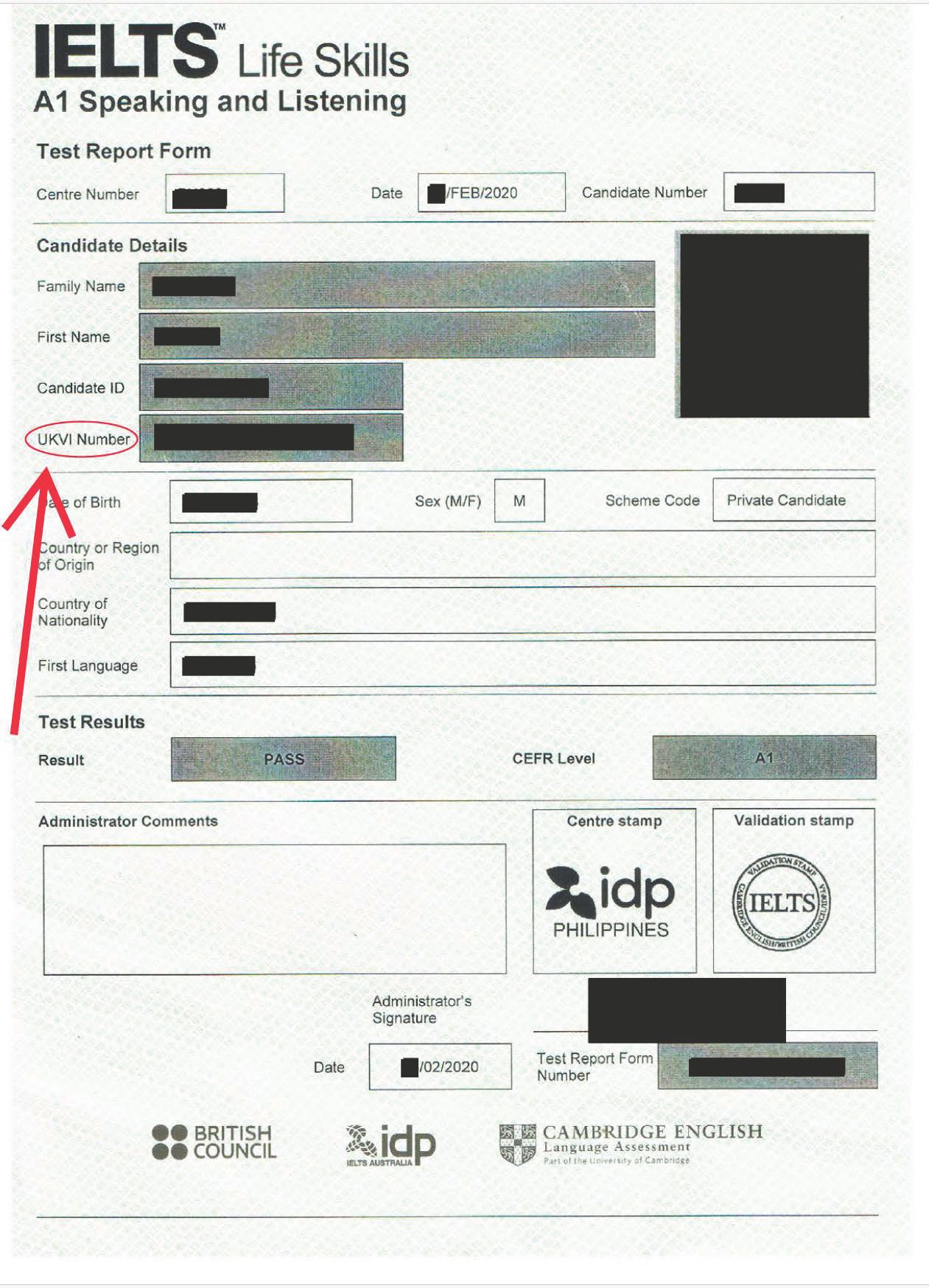
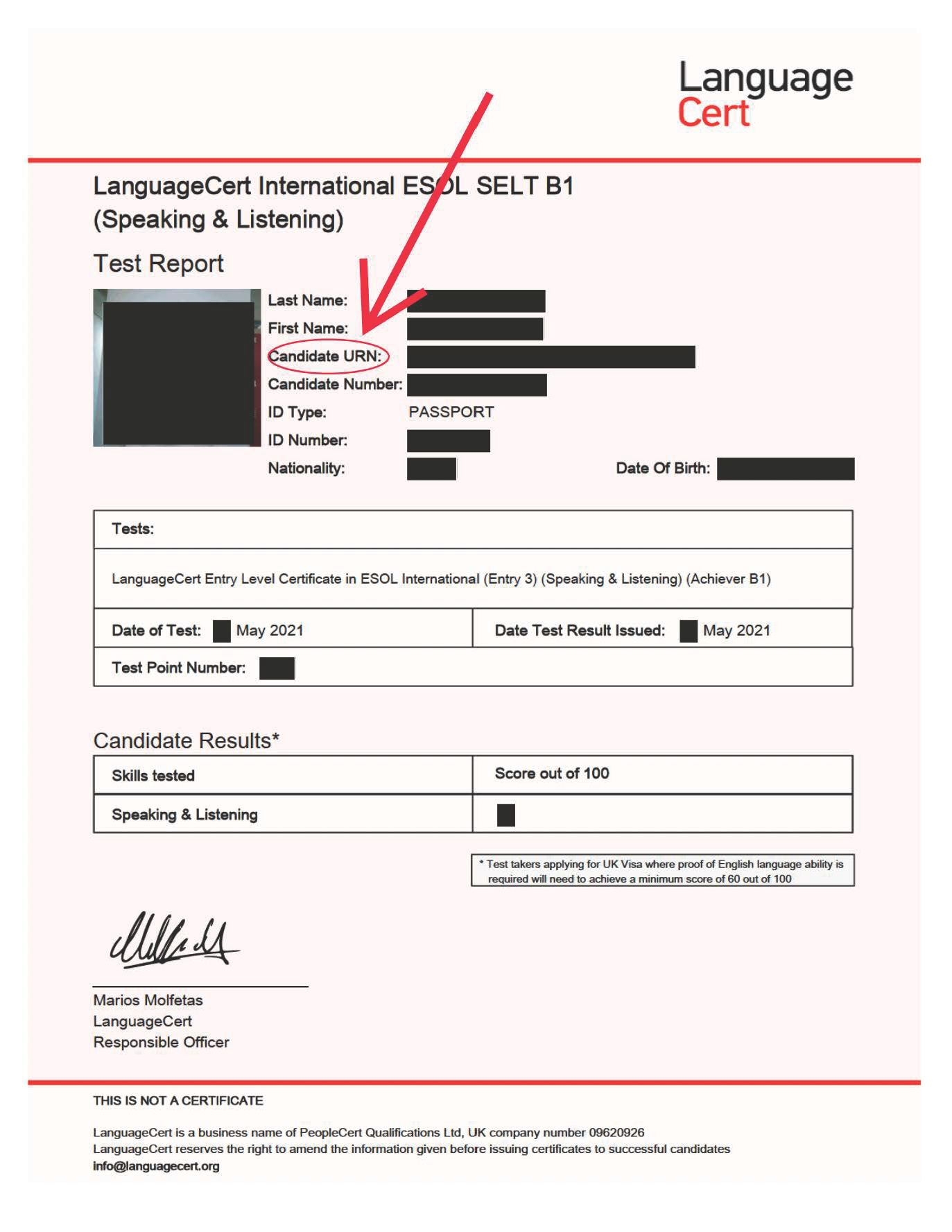
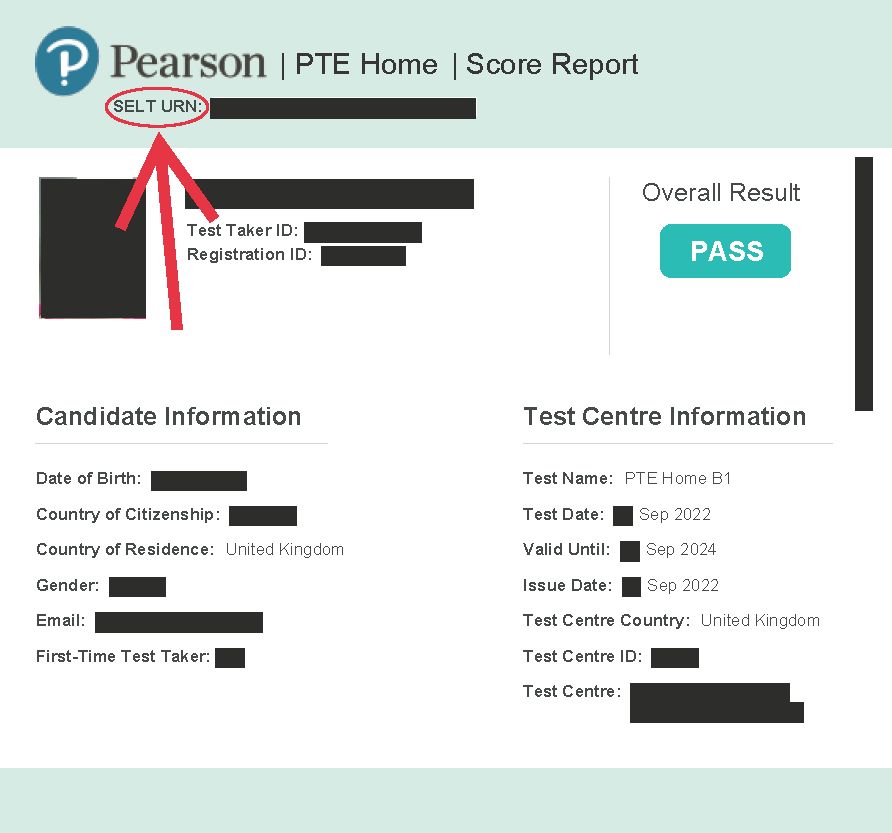
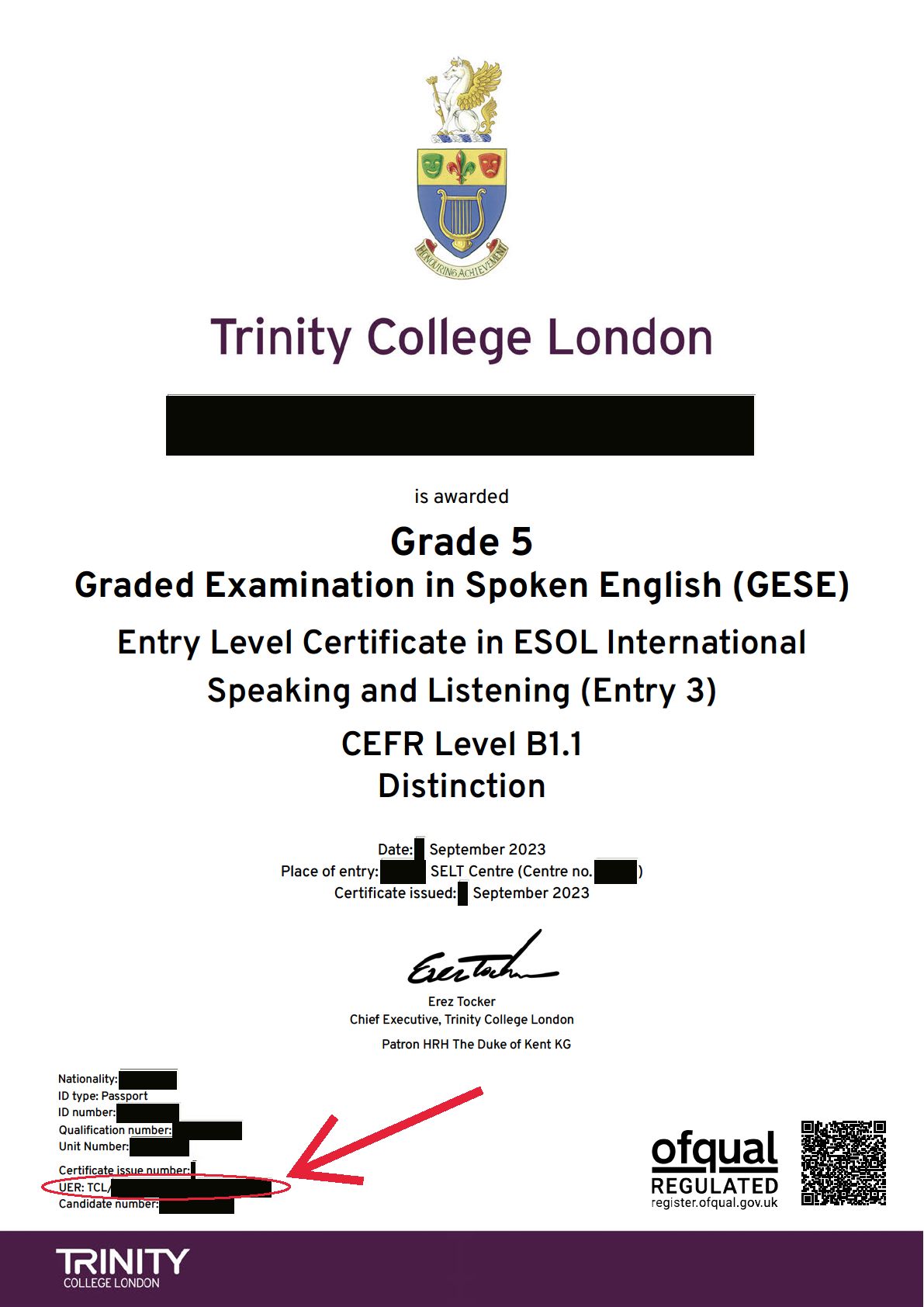
Sometimes you might find that the certificate you have – which can now been obtained from an online portal – is missing the reference, like here:
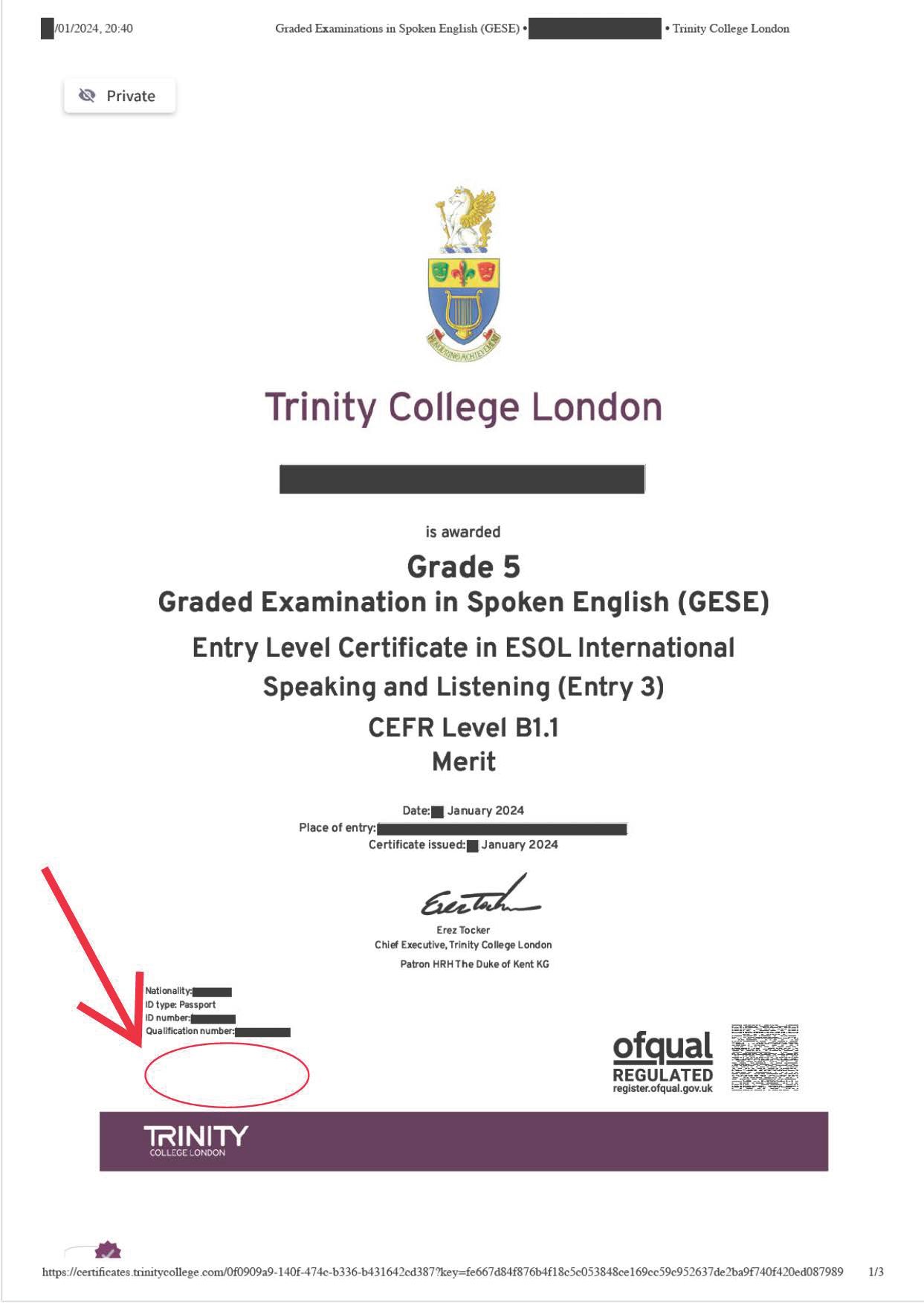
For some reason, the Unique Reference Number (UER) didn’t make it through into the downloaded PDF.
Would this document have satisfied the English language requirement in a partner application to the Home Office? We don’t know because we didn’t submit it.
As it states in its public facing guidance, the procedure that the Home Office would follow in this case is not available:

But it would likely require a caseworker receiving this as part of an application to take an additional step to verify the document, and may create an increased risk of refusal and/or delay in the application.
So we would recommend contacting the test-provider in the first instance to deal with any issues like this.
How long can I use a test for?
In the vast majority of cases, in order to meet the requirement in this way, you need to have passed the test in the last 2 years.
It may be possible to rely on a test older than 2 years if you have already shown you met the requirement in a previous successful application for entry clearance or permission to stay.
However, this is not always a straightforward part of the requirement to navigate, and may depend on where/when you took the previous test, so be sure to check the relevant guidance carefully if you intend to rely on this.
A reminder that if take a B1 test at the outset (i.e. prior to your first partner visa application), then you can continue to rely on this in subsequent applications (and meaning that you won’t have to take any more English tests in order to meet the requirements in
Exemptions
There are some exemptions from meeting the English language requirement, and which I am not going to cover in detail here:
- they are aged 65 or over at the date of application
- they have a disability (physical or mental condition) which prevents them from meeting the requirement
- there are exceptional circumstances which prevent them from meeting the requirement